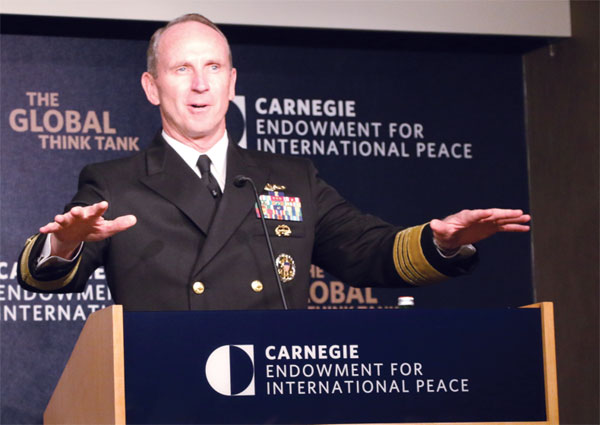US Naval chief: Air incident should not define US-China relations
Updated: 2014-09-09 10:51
By Chen Weihua in Washington(China Daily USA)
|
||||||||
The US' top naval officer said his country won't stop or reduce its reconnaissance near the Chinese coast but added that a recent air incident should not define the US-China relationship.
Speaking in Washington on Monday, Admiral Jonathan Greenert, chief of US naval operations, said of such incidents, "I am concerned it will happen in the future."
He was talking about the Aug 19 close encounter between a Chinese People's Liberation Army Navy fighter jet and a US Navy reconnaissance airplane about 200 km off China's Hainan Island. While Greenert described the Chinese pilot's behavior as "unprofessional", Chinese Ministry of Defense spokesman Yang Yujun said it was "professional" and instead called on the US to reduce and ultimately stop its close-in reconnaissance of China.
|
Admiral Jonathan Greenert, chief of US Naval Operations, talks about the US rebalance to Asia-Pacific region at a seminar on Monday at the Carnegie Endowment for International Peace (CEIP) in Washington. Chen Weihua / China Daily |
China has repeatedly raised the surveillance issue to the US over the years, regarding it as a provocative act and an impediment to improving bilateral military ties.
Asked if the US intends to reduce the reconnaissance flights, Greenert said: "There is no intention that I am aware of to do that. We are flying in international airspace."
"We'll continue to operate in international airspace. We made that clear and we'll proceed ahead," he said.
Greenert is expected to meet with PLA Navy Commander Admiral Wu Shengli at the 21st International Seapower Symposium to be held at the US Naval War College in Newport, Rhode Island on Sept 16-19. The two have met four times in the past year, which Greenert said was more times than meetings with chiefs from other nations.
While saying such air incidents should never happen, Greenert reminded the audience that "it should also not define our relationship".
He emphasized the importance of avoiding miscalculation through increased communication, citing last December's close encounter of a PLA Navy fleet and the USS Cowpens in the South China Sea. The situation was resolved through bridge-to-bridge communication between the Chinese aircraft-carrier Liaoning and the Cowpens. The captain of the Chinese carrier visited the Pentagon last September, with Admiral Wu.
Greenert praised China for hosting the biennial Western Pacific Naval Symposium in Qingdao this April. "I think that's commensurate with a rising navy. It makes sense," he said.
At that meeting, more than 20 navies voluntarily signed the Code for Unplanned Encounters at Sea (CUES).
"I think we made a pretty good step forward," Greenert said. "It will establish professional behavior and clear communication that we need to reduce uncertainty when we meet and increase safety."
Naval ships from the US, China, Brunei, Indonesia and Singapore exercised under the CUES protocol in July during the Rim of the Pacific exercises when they sailed from Guam to Hawaii, according to Greenert.
Greenert, who took the top naval post three years ago, said the US and China need to build a constructive relationship. "That is what we have been directed to do and that's what my focus has been," he said.
"Clearly we've got the potential to prosper with China," he said, citing China as the world's second largest economy, top US Treasury bond holder and each other's major trade partners.
"So we are going to make it work," said Greenert.
He said that the Chinese told him that they want to become a global navy but they don't intend to pose a global posture like the US does.
"They have shown the ability to embrace international norms and standards," said Greenert. He described the Chinese counter-piracy operations as "quite effective", commended PLA Navy hospital ship Peace Ark's role in humanitarian assistance and disaster relief after Typhoon Haiyan hit the Philippines last November and said the PLA Navy fleet participating in RIMPAC was "quite professional" and "well-prepared".
Greenert described his talks with Admiral Wu as "pretty frank and candid" and said the visits he had on the Chinese carrier and other naval ships reflected "more transparency and more openness than I have seen in the past".
Greenert paid a four-day visit to China in July, meeting Admiral Wu, visiting PLA naval ships and interacting with crews.
According to Greenert, the two sides are working on seven initiatives that include practical CUES, to move navies ahead on things mutually agreed, to establish regular communication between himself and Admiral Wu, to increase academic exchanges, to work on human resources best practice and pre-approved exercises.
Greenert admitted that the issues won't be solved overnight. "The bottom line: we cannot have miscalculation," he said, emphasizing the need to educate officers and give them the necessary means and protocols.
Jonathan Pollack, senior fellow at the Brookings Institution, described Greenert as an optimist. "He has the interest of his service. He is very clear about that."
chenweihua@chinadailyusa.com
(China Daily USA 09/09/2014 page1)
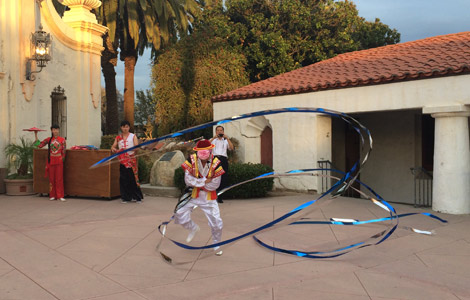
 Cultural performance
Cultural performance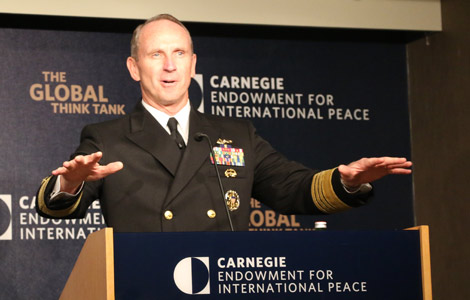
 Air incident should not define US-China relations
Air incident should not define US-China relations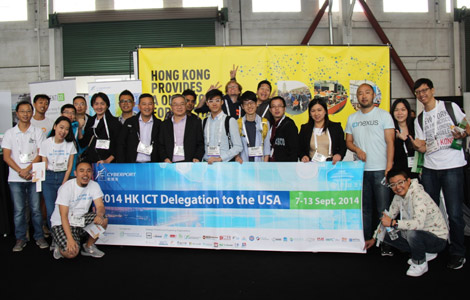
 Ready to disrupt
Ready to disrupt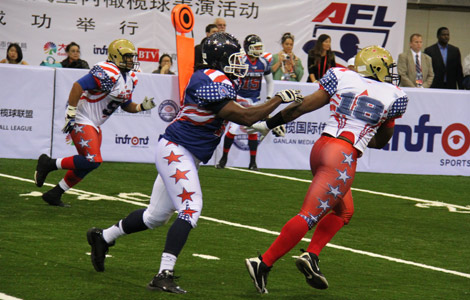
 Is China ready for football?
Is China ready for football?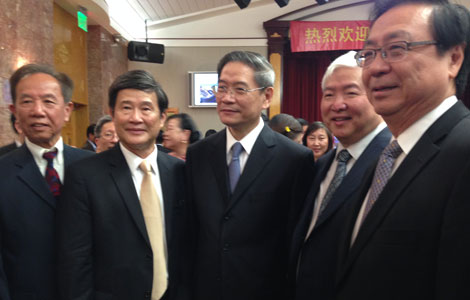
 Taiwan affairs chief visits US
Taiwan affairs chief visits US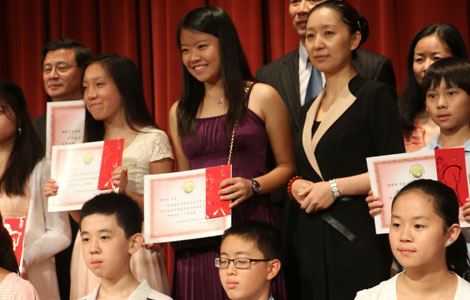
 Chinese embassy in Washington holds Teachers' Day reception
Chinese embassy in Washington holds Teachers' Day reception
 Walt Disney 90th Anniversary Exhibition held in Beijing
Walt Disney 90th Anniversary Exhibition held in Beijing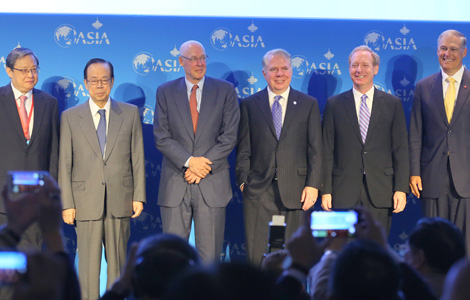
 Boao Forum for Asia Seattle conference kicks off
Boao Forum for Asia Seattle conference kicks off
Most Viewed
Editor's Picks

|

|

|

|

|

|
Today's Top News
China, US rein in disputes
Alibaba kicks off IPO global roadshow in NY
US tech firm joins Chinese plant to help curb pollution
China's poverty cut off too low: expert
Holiday gifts breach anti-graft rule
Tsinghua, Berkeley prepare joint institute
Moon Festival on the fast rise
Alibaba's IPO to set a new record
US Weekly

|

|
